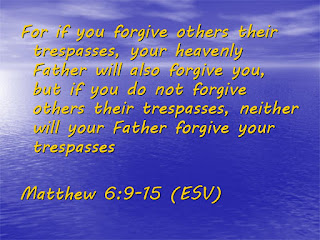Christians teach that we live in a ‘fallen’ world. There is a lot of evil around. We are born with a tendency to disobey God,
to live for ourselves. So it is very
easily to get hurt, not only physically but emotionally. We can hurt others deeply too and not even
realise it.
Here are just a few examples:
· A boy was constantly interrupted when he was
small and was seldom listened to. He
ended up with a stammer.
· A girl is taken from her parents when she is a
baby because they are drug addicts and live a chaotic life. She is adopted. She constantly misbehaves, challenges her
adoptive parents and does not accept their love.
· A boy was laughed at and put down by parents and
other boys at school for being skinny.
At the age of eleven, he was touched inappropriately by a female medical
professional when he was being examined.
He developed a liking for pornography.
· A girl from a talented family is rejected,
laughed at and put down by her family for being ‘thick’. From her teens onwards, she becomes
rebellious, uses drugs, is sexually promiscuous and makes poor relationship
choices.
I could write a very long list of all the things that may
affect us.
When we suffer pain that is too deep for us to deal with in
any normal, natural way, we ‘bury’ it. In
other words, the memory remains locked inside of us but we do not consciously
recall it. We develop an outer ‘shell’,
a kind of hard exterior to protect ourselves from the memory. We may dress or behave in a way that warns
people off getting too close to us. This
can make it hard for us to develop really deep relationships and we will have a
feeling of emotional dullness. If we
have always lived with that, we may not even realise it is there.
To stop ourselves from getting hurt, we may become
risk-averse. So we shut ourselves away
and stop getting into any relationships that may hurt us. We may stay away from people and over-indulge
in eating, drinking, watching hours of television, fantasy books and films,
pornography and so on.
The emotional dullness we feel is also unpleasant and we
will crave ‘real’ feelings. If we have a
sociable nature, we will look for others with similar interests. In order to feel ‘alive’, we indulge in
various habits with them, which could include:
- Recreational
drugs
- Parties,
pub-crawls
- Alcohol,
drunkenness
- Casual
Sex
- Extreme
sports
In either instance, we will find it impossible to develop
real, genuine, loving, long-term relationships with others.
Why is the memory we have buried so hard to uncover? I want to suggest a couple of the most common
reasons.
- Recalling
the incident brings so much revulsion and hatred to the surface that we
would be embarrassed to show that much emotion and we may feel a deep
sense of guilt and shame over how we feel.
We become further traumatised.
- Our
hatred may be turned in on ourselves.
We blame ourselves. To admit
to ourselves, or anyone else that that is how we feel would bring further
trauma.
In both cases, in order to be restored, we will need to forgive either ourselves or others. This is the first step to being healed and restored. Our reaction to pain is to either:
• blame ourselves, so we then need to forgive ourselves, or
• grow bitter towards the person or people who have hurt us, so we need to forgive them.
• grow bitter towards the person or people who have hurt us, so we need to forgive them.
Sometimes we will have an irrational anger towards people like those who have hurt us. There may be a personality type we react badly to or simply avoid because they ‘represent’ the person who hurt us.
When we receive God’s forgiveness for our sins, we are in a safe place. The bible says,
...hope does not put us to shame, because God's love has been poured into our hearts through the Holy Spirit who has been given to us.
Romans 5:5
Romans 5:5
Jesus said:
Come to me, all who labour and are heavy laden, and I will give you rest. Take my yoke upon you, and learn from me, for I am gentle and lowly in heart, and you will find rest for your souls. For my yoke is easy, and my burden is light.
Matthew 11:28-30
Matthew 11:28-30
When we are in the safe place of God’s loving presence, we can gradually, one by one, unlock the painful memories, protected from the pain we originally felt.
Having the help of someone who is mature helps. I love the proverb quoted in the picture. To be a man or woman of understanding, who can lovingly listen and 'draw somebody out', so that the pain can be healed is a great gift.







